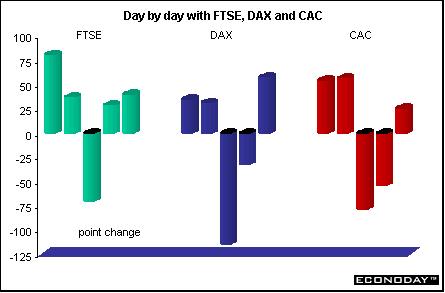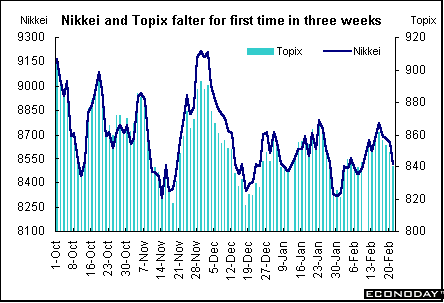 |

Europe and Britain
The London FTSE 100 kept its winning streak alive and rose 3.2 percent, the third consecutive weekly increase. But gloom over Germany's sinking economy spread to investors. The DAX lost 1 percent last week and is currently down the most on the 2002 year end - 8.4 percent. The indexes continue to follow the daily trends of the Dow and NASDAQ. They also continue to follow U.S. indicators closely, especially those that would impact their domestic economies. The rise in the euro has many large German exporters on edge and claiming that it is hurting sales.

Asia
With the end of the fiscal year looming on March 31, most Japanese investors are preoccupied with news outside Japan, particularly the chance of war in the Middle East. Usually, investor anxiety crescendos as the end of the Japanese fiscal year nears. In most years, stocks prices fall in February and March and bank balance sheets prompt worries of a financial meltdown. The government usually then puts together an emergency program, prompting investors to buy equities and helping the market miraculously turn up before the March 31 deadline. But this year, the banks are in such bad shape that they finally are writing off more bad debts, raising new capital and selling more of their own stocks. The banks are also cutting jobs and closing more branches. Even the Bank of Japan is helping. It has offered to buy upwards of ¥2 trillion of stocks to help banks unload risky assets (so far the BoJ has only bought about 25 percent of the total).

The short-term aid may not solve the banks' more vexing problems once the new fiscal year starts. Deflation continues unabated, making it harder for borrowers to repay their debts. If the Bank of Japan and the government do not figure out a way to halt the four-year decline in prices, it is highly possible that nonperforming loans will continue piling up faster than the banks can write the old ones off.


Last Week's Highlights • Global Stock Market Indexes • Recap of Global Markets • Currencies • Indicator Scoreboard

The Bottom Line • Looking Ahead
|
 |